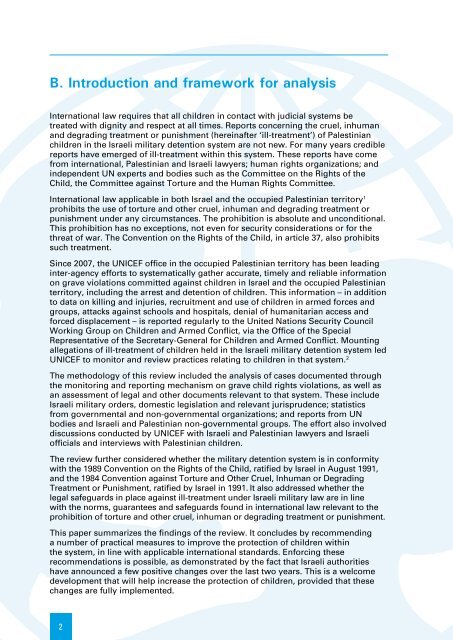Children in israeli Military detention
Children in israeli Military detention
Children in israeli Military detention
Create successful ePaper yourself
Turn your PDF publications into a flip-book with our unique Google optimized e-Paper software.
B. Introduction and framework for analysis<br />
International law requires that all children <strong>in</strong> contact with judicial systems be<br />
treated with dignity and respect at all times. Reports concern<strong>in</strong>g the cruel, <strong>in</strong>human<br />
and degrad<strong>in</strong>g treatment or punishment (here<strong>in</strong>after ‘ill-treatment’) of Palest<strong>in</strong>ian<br />
children <strong>in</strong> the Israeli military <strong>detention</strong> system are not new. For many years credible<br />
reports have emerged of ill-treatment with<strong>in</strong> this system. These reports have come<br />
from <strong>in</strong>ternational, Palest<strong>in</strong>ian and Israeli lawyers; human rights organizations; and<br />
<strong>in</strong>dependent UN experts and bodies such as the Committee on the Rights of the<br />
Child, the Committee aga<strong>in</strong>st Torture and the Human Rights Committee.<br />
International law applicable <strong>in</strong> both Israel and the occupied Palest<strong>in</strong>ian territory 1<br />
prohibits the use of torture and other cruel, <strong>in</strong>human and degrad<strong>in</strong>g treatment or<br />
punishment under any circumstances. The prohibition is absolute and unconditional.<br />
This prohibition has no exceptions, not even for security considerations or for the<br />
threat of war. The Convention on the Rights of the Child, <strong>in</strong> article 37, also prohibits<br />
such treatment.<br />
S<strong>in</strong>ce 2007, the UNICEF office <strong>in</strong> the occupied Palest<strong>in</strong>ian territory has been lead<strong>in</strong>g<br />
<strong>in</strong>ter-agency efforts to systematically gather accurate, timely and reliable <strong>in</strong>formation<br />
on grave violations committed aga<strong>in</strong>st children <strong>in</strong> Israel and the occupied Palest<strong>in</strong>ian<br />
territory, <strong>in</strong>clud<strong>in</strong>g the arrest and <strong>detention</strong> of children. This <strong>in</strong>formation – <strong>in</strong> addition<br />
to data on kill<strong>in</strong>g and <strong>in</strong>juries, recruitment and use of children <strong>in</strong> armed forces and<br />
groups, attacks aga<strong>in</strong>st schools and hospitals, denial of humanitarian access and<br />
forced displacement – is reported regularly to the United Nations Security Council<br />
Work<strong>in</strong>g Group on <strong>Children</strong> and Armed Conflict, via the Office of the Special<br />
Representative of the Secretary-General for <strong>Children</strong> and Armed Conflict. Mount<strong>in</strong>g<br />
allegations of ill-treatment of children held <strong>in</strong> the Israeli military <strong>detention</strong> system led<br />
UNICEF to monitor and review practices relat<strong>in</strong>g to children <strong>in</strong> that system. 2<br />
The methodology of this review <strong>in</strong>cluded the analysis of cases documented through<br />
the monitor<strong>in</strong>g and report<strong>in</strong>g mechanism on grave child rights violations, as well as<br />
an assessment of legal and other documents relevant to that system. These <strong>in</strong>clude<br />
Israeli military orders, domestic legislation and relevant jurisprudence; statistics<br />
from governmental and non-governmental organizations; and reports from UN<br />
bodies and Israeli and Palest<strong>in</strong>ian non-governmental groups. The effort also <strong>in</strong>volved<br />
discussions conducted by UNICEF with Israeli and Palest<strong>in</strong>ian lawyers and Israeli<br />
officials and <strong>in</strong>terviews with Palest<strong>in</strong>ian children.<br />
The review further considered whether the military <strong>detention</strong> system is <strong>in</strong> conformity<br />
with the 1989 Convention on the Rights of the Child, ratified by Israel <strong>in</strong> August 1991,<br />
and the 1984 Convention aga<strong>in</strong>st Torture and Other Cruel, Inhuman or Degrad<strong>in</strong>g<br />
Treatment or Punishment, ratified by Israel <strong>in</strong> 1991. It also addressed whether the<br />
legal safeguards <strong>in</strong> place aga<strong>in</strong>st ill-treatment under Israeli military law are <strong>in</strong> l<strong>in</strong>e<br />
with the norms, guarantees and safeguards found <strong>in</strong> <strong>in</strong>ternational law relevant to the<br />
prohibition of torture and other cruel, <strong>in</strong>human or degrad<strong>in</strong>g treatment or punishment.<br />
This paper summarizes the f<strong>in</strong>d<strong>in</strong>gs of the review. It concludes by recommend<strong>in</strong>g<br />
a number of practical measures to improve the protection of children with<strong>in</strong><br />
the system, <strong>in</strong> l<strong>in</strong>e with applicable <strong>in</strong>ternational standards. Enforc<strong>in</strong>g these<br />
recommendations is possible, as demonstrated by the fact that Israeli authorities<br />
have announced a few positive changes over the last two years. This is a welcome<br />
development that will help <strong>in</strong>crease the protection of children, provided that these<br />
changes are fully implemented.<br />
2


